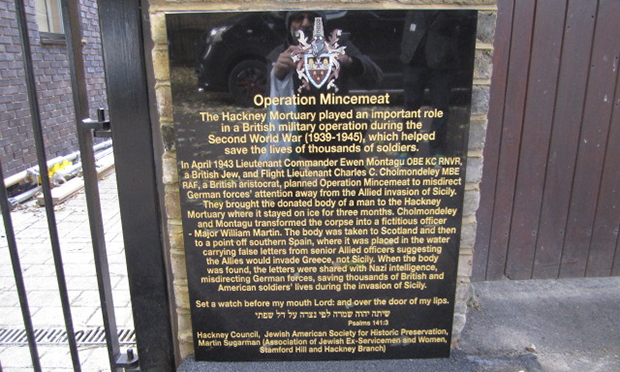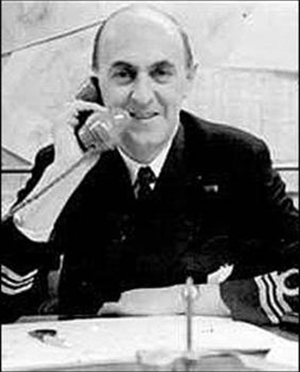Hackney’s role in stranger-than-fiction wartime escapade commemorated with plaque

On a cold spring day in 1943, an unassuming building in a Hackney side street played a key role in a wartime deception which was to save thousands of lives.
The body of Glyndwr Michael, a homeless man who had been found dead in King’s Cross, was taken to Hackney mortuary and dressed as a fictional wartime officer, acting major William Martin.
Fake documents designed to deceive the enemy were tucked into his clothing.
Letters from military top brass were also placed on his body – suggesting the Allies planned to invade Europe via Greece. In fact the real plan was to stage an invasion at the Italian island of Sicily.
Hackney’s role in this deception has not been marked until now.
If it sounds like the stuff of spy fiction, that might be because James Bond author Ian Fleming was involved in the plan.
But he was nowhere near the cold and forbidding mortuary off Mare Street on the edge of St John’s Churchyard.
That role fell to two Secret Intelligence officers – Commander Ewen Montagu, a Jewish barrister who later became a well known judge, and wealthy aristocrat Flight Lt. Charles Cholmondeley. They were involved in planning the deception.
The part Hackney mortuary played will also reach a wider audience thanks to the determination of historian Martin Sugarman, who is archivist of the Association of Jewish Ex-Servicemen and Women.
“Why Hackney mortuary was used, no-one knows,” said Mr Sugarman, who was determined its part in wartime history was celebrated. “The mortuaries could have been full because it was wartime.
“If Montagu’s role was known he would have been a target for agents. He would have been in danger.”
The mortuary’s secret is now laid bare with a freshly installed plaque.

Montagu and Cholmondeley were joined on the hush hush job by London’s chief coroner Bentley Purchase and a racing driver who whisked the officers and a special container for the body, packed with dry ice, to a submarine base in Scotland.
The body was dumped off the coast of Spain and it eventually washed up nearby, with the fake documents discovered and their contents sent all the way to Berlin.
It meant German soldiers, tanks, aircraft and artillery were diverted to Greece from Italy and Sicily, and there were fewer casualties when the Allies landed on the island in July 1943 – one of the turning points of the war.
The audacious story will be brought to the big screen next year in a film called Operation Mincemeat, based on the 2010 book of the same name by journalist Ben Macintyre.
Colin Firth takes on the role of Ewen Montagu and Matthew Macfadyen plays Charles Cholmondeley.
Montagu published his account of what happened in the 1953 book, The Man Who Never Was, which was also made into a film.
However, many details had to remain shrouded in mystery because of the Official Secrets Act.
The new plaque on the mortuary wall was financed by Jerry Klinger of the Jewish American Society for Historic Preservation, UK branch, following the work of Martin Sugarman and the Hackney and Stamford Hill Association of Jewish Ex-Servicemen and Women of the UK (AJEX).
Hackney Council and St-John-at-Hackney Church are caring for it.
Sugarman, who was born in Hackney, is a former head of sixth form at Clapton School and has also taught at other schools in East London.
He is the author of five books about the Jewish contribution to the Second World War.
“I was in touch with Montagu’s family about another matter to do with the war and discovered about the link to Hackney through Ben Macintyre’s book,” he explained.
“It was the only place where the four main players came together – the body, the racing driver, the coroner and the two officers from Secret Intelliigence. I went to the mortuary and they knew all about it.
“It is an important event and thousands of lives were saved because of it.”
He said it is “crucially important” to celebrate its role in Jewish wartime history, as it “shows the diversity of the war effort”.
“In terms of Jewish history, it is part of standing up to antisemitism,” he added.
Montagu played a vital role overseeing naval deception involving special agents.
After the war, he became involved in a public health project and served as president of the United Synagogue.
He died in 1985, aged 84.
Now his pivotal and previously top secret role in wartime history will be celebrated in Hackney.
